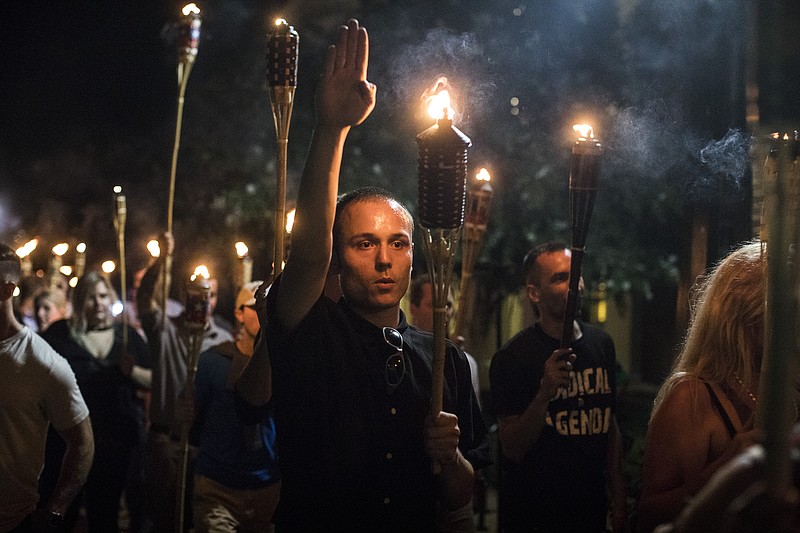The power of Biden
Clearly, Joe Biden's entry into the 2020 presidential race is concerning to Donald Trump. And apparently Biden's entry announcement video was especially concerning to the president.
Biden talked about the shocking moment when President Trump said of the 2017 Charlottesville, Va., violence at a white nationalist rally, "there were some very fine people on both sides."
"With those words, the president of the United States assigned a moral equivalence between those spreading hate and those with the courage to stand against it," Biden said. "And in that moment I knew the threat to this nation was unlike any I've ever seen in my lifetime. I wrote at the time that we are in a battle for the soul of this nation."
The video and Biden's announcement came out Thursday. In less than a day, Trump took the bait.
"People were there [in Charlottsville] protesting the taking down of the monument of Robert E. Lee. Everybody knows that," Trump told reporters Friday.
No. Actually what everybody with a television or a computer saw was a "Unite the Right" march organized by white nationalist groups upset over plans to remove a statue of the Confederate general from a local park. A very large crowd of torch-bearing men and women marched across the quadrangle of the University of Virginia to the statue, shouting, among other things, "You will not replace us. Jews will not replace us."
That was the evening precursor to the August violence in Charlottesville that led to several fights breaking out between far-right attendees and anti-racism activists and counter-protesters. One woman was killed when a driver plowed a car into a crowd of the counter-protesters.
When Trump finally condemned the violence, he raised eyebrows and outrage with his fault on "many sides" and fine people on "both sides" comments.
This week, between slaps at "sleepy Joe," the president doubled down on his own "both sides" defense of why he did not condemn white nationalism.
"If you look at what I said, you will see that question was answered perfectly," he said.
Joe's right. It is a fight for the soul of our nation.
And Trump knows it, too.
The welfare myth
What do you suppose 13 states - including Tennessee - discovered after spending hundreds of thousands of dollars drug testing the poor as a condition of receiving Temporary Assistance for Needy Families, or TANF as welfare has been renamed.
Out of more than 263,000 applicants, less than 1 percent, were rejected for drugs.
Less than 1 percent. For that outcome, the states spent $201,231. Only 338 people tested positive, according to data gathered by ThinkProgress, a progressive-leaning online news site. (While universal drug testing for TANF was ruled unconstitutional in 2014, the 13 states now require either applicants or beneficiaries with a "reasonable suspicion" of drug misuse be tested. The other states that test are Alabama, Arkansas, Arizona, Kansas, Maine, Mississippi, Missouri, North Carolina, Oklahoma, Utah, Wisconsin and West Virginia.)
If people refuse to cooperate, they cannot receive federal aid.
Liz Schott, a senior fellow at the Center on Budget and Policy Priorities, a nonpartisan research institute that works to reduce poverty, told ThinkProgress that such tests assume people who need federal assistance are more likely to misuse drugs than the general public. But she says it amounts to shaming people who just need a little more help.
"It's certainly not about helping people with substance misuse problems - it is about stigmatizing," she said.
Schott highlighted Tennessee, where lawmakers are trying to make the TANF requirement more punitive by requiring enrollees to submit to a hair follicle test instead of a urine test for more accuracy and by making it illegal to falsely answer the drug screening questionnaire.
In a March op-ed in the Paris, Tennessee, Post-Intelligencer, the bill sponsor, Rep. Bruce Griffey, R-Paris, wrote:
"It is fundamentally unfair for some of us to obey the laws and get up and go to work every day, only to have a portion of the money that we work hard to earn go to pay for the housing, food, utilities, phones, gas and other benefits of others who sit at home all day unemployed and using drugs."
In 2018, Tennessee's Department of Human Services received 12,274 new applications for TANF. Of the 315 referred for drug testing, 187 completed the test and just 18 tested positive.
Tennessee's cost for that effort was $8,783.65.
Based on the July 2018, Tennessee TANF statistics printed on the state's website, the average monthly cash benefit for participating families was $167.15.
For the cost of that testing (and eliminating 18 people for positive results), 52 more families could have been helped.
And this is cost effective?
